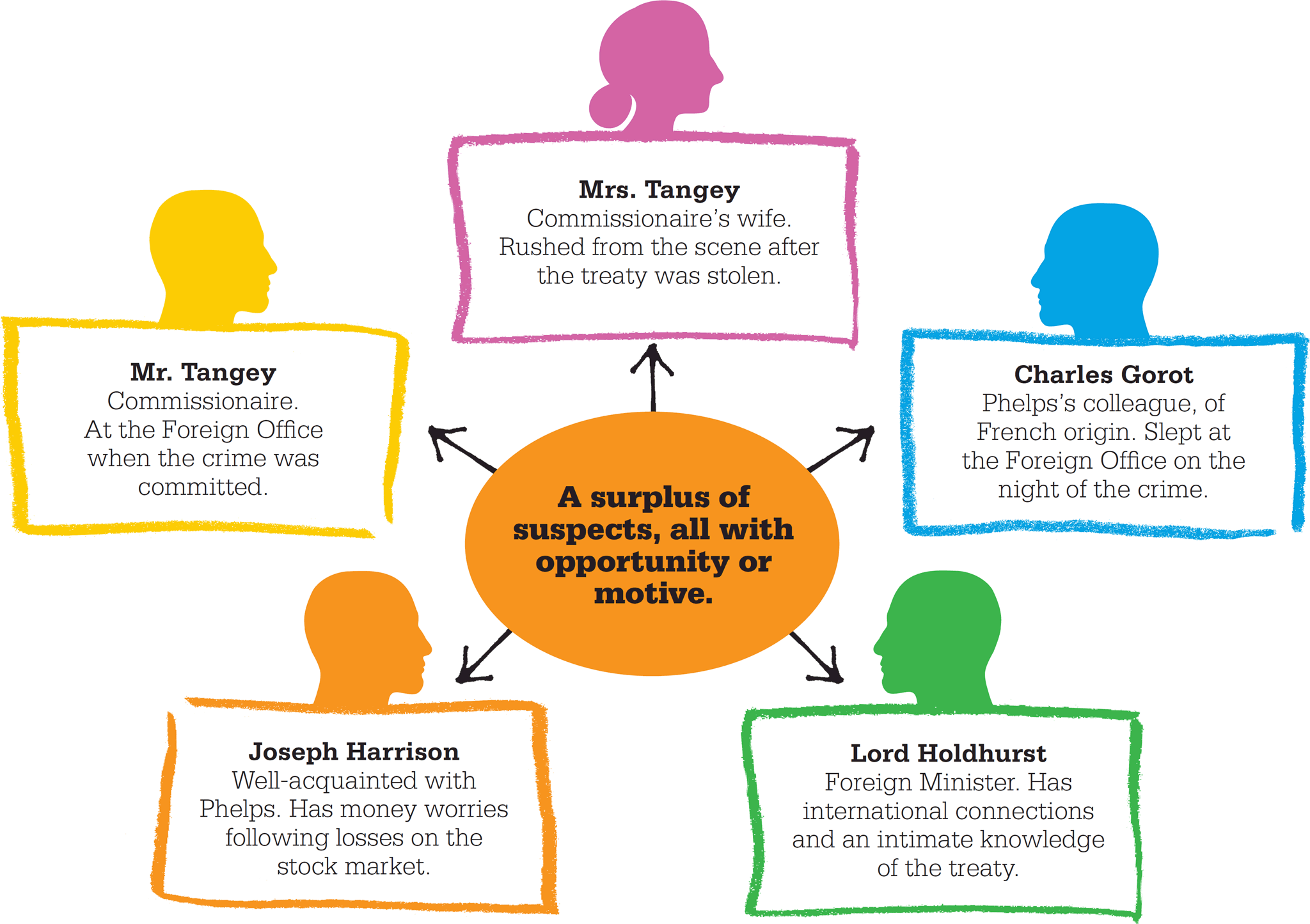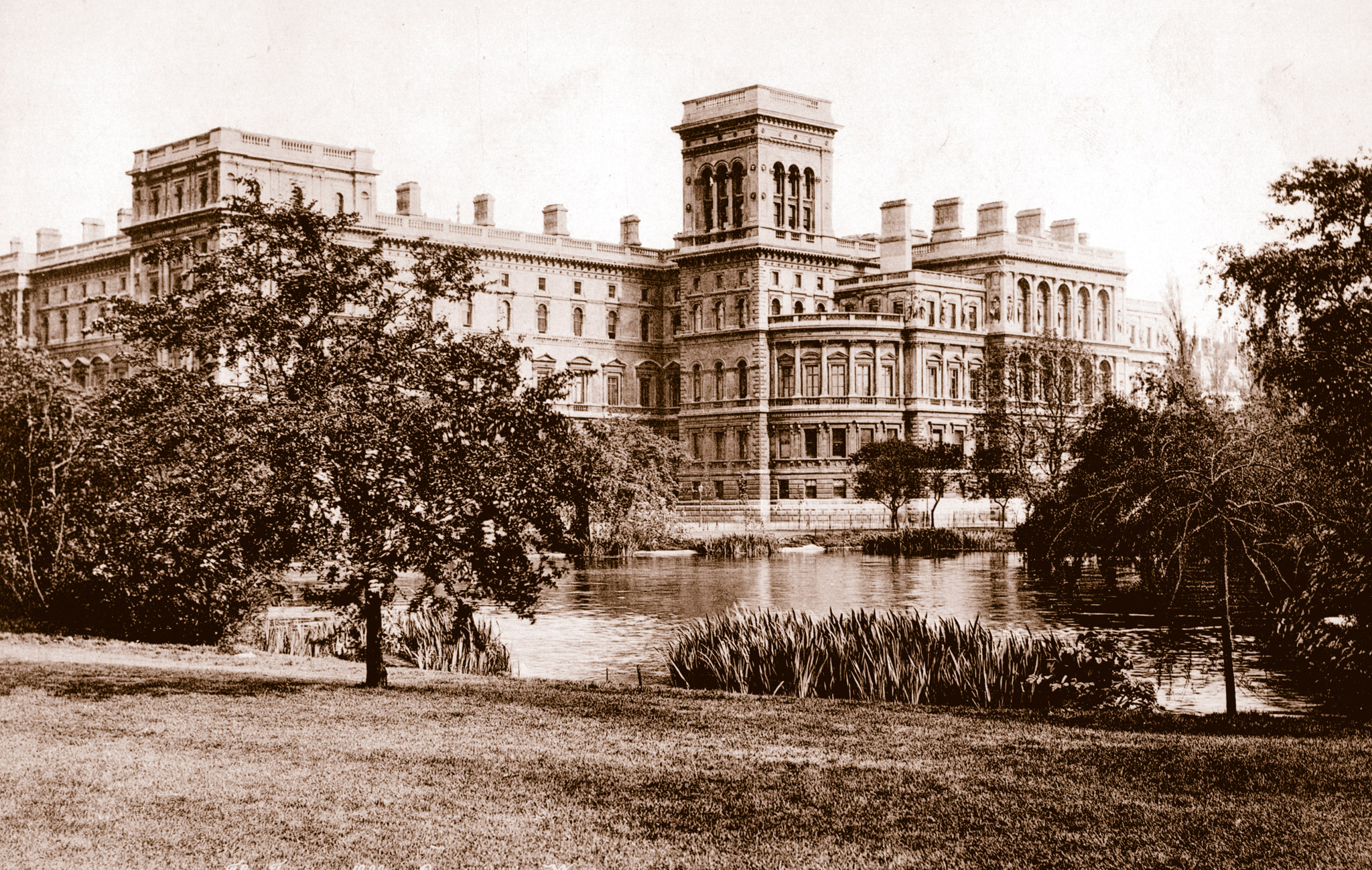
IN CONTEXT
Short story
UK: October 1893
US: October 1893
The Memoirs of Sherlock Holmes, 1894
Percy Phelps Clerk in the Foreign Office.
Lord Holdhurst Foreign Minister and Phelps’s uncle.
Annie Harrison Phelps’s fiancée and nurse.
Joseph Harrison Brother of Annie.
Mr. and Mrs. Tangey Foreign Office commissionaire and his wife.
Charles Gorot Phelps’s colleague at the Foreign Office.
Mr. Forbes Scotland Yard detective.
At the start of this story, Watson receives a letter from his former schoolmate Percy Phelps, who is bedridden at his family home, Briarbrae, in Woking. Phelps is suffering from “brain fever” caused by a distressing event: he believes his career is possibly ruined, and he is requesting the help of Holmes. Conan Doyle is particularly fond of using the now-archaic term “brain fever” to refer to nervous illness, and appears in several Holmes stories, including “The Adventure of the Copper Beeches”, “The Crooked Man”, and “The Musgrave Ritual”.
At Briarbrae, Watson and Holmes meet Joseph Harrison, the brother of Phelps’s fiancée, Annie. In a ground-floor room, where in fact Joseph has been staying until recently, the delicate patient, Phelps, outlines his predicament from the sofa. As with “The Adventure of the Engineer’s Thumb”, this scene is reminiscent of Sigmund Freud’s “couch” consultations that would soon become a fashionable treatment for nervous complaints.

The series of events
Almost 10 weeks previously, Percy Phelps’s uncle—the Foreign Minister Lord Holdhurst—entrusted his nephew with hand-copying a secret treaty between Britain and Italy. To contemporary readers this would have been thrillingly up to date: the “Triple Alliance” between Germany, Austria–Hungary, and Italy, in 1882, was a key part of the system of allegiances that would lead to World War I, and there was indeed a secret agreement between Italy and Britain in 1887.
It was clear to Phelps that the French or Russian embassies would pay handsomely for such classified information, so, as instructed by Holdhurst, he waited until his colleagues had all left work before carrying out the task. Feeling sleepy, Phelps rang the bell for some coffee and, to his surprise, it was the commissionaire’s wife, Mrs. Tangey, who took his order. When the coffee failed to arrive, Phelps went to discover the cause of the delay and found Mr. Tangey, the commissionaire, asleep at the front entrance with the kettle boiling over—and no sign of Mrs. Tangey. Suddenly, the bell rang from the office Phelps had been working in. Panicked at the thought of someone being in the same room as the top-secret document, he dashed upstairs to discover that it had disappeared. Phelps realized the thief must have entered via the side door; he had used the main staircase and so would have seen him or her entering the building.
A policeman on duty outside the Foreign Office saw only one person, whose description fitted that of Mrs. Tangey, leave via the side door. Despite the commissionaire’s claim that his wife’s integrity was beyond reproach, Phelps chased her home. He and a Scotland Yard detective named Forbes questioned her about the document and she was searched, but nothing was found. Unsure what to do, Phelps made his way home, having missed the train he was supposed to have caught earlier with Joseph Harrison.
"A cold hand seemed to close round my heart. Someone, then, was in that room where my precious treaty lay upon the table."
Percy Phelps
An impossible situation
Several stories above ground level and with no possible hiding places, Phelps’s office provides no clues. There were no footprints at the scene of the crime (even though it was a wet night) and no evidence that someone had been smoking there, which disappoints Holmes since stray ash at a crime scene often provides his first clue (in A Study in Scarlet he mentions making “a special study of cigar ashes”). The description of Phelps’s workplace fits the real Foreign Office—a grand classical building completed in the 1860s by the architect George Gilbert Scott. (Scott’s own grandson, Giles, was to design London’s red telephone booth—almost as much as an icon of the city as Holmes himself).

The British Foreign Office sat at the heart of the Empire in Victorian Britain. It was a place of complex diplomacy and political maneuvering, and a prize target for international espionage.
A conspiracy?
To learn more about the case, Holmes and Watson visit detective Forbes, who is distinctly unfriendly. He does reveal that Mrs. Tangey is of bad character, being a drinker with money problems, and that he suspects she knows something about the crime, although he has no proof. Other less likely suspects are the commissionaire himself and Phelps’s colleague, Charles Gorot, whose French name has aroused suspicion, since it suggests a motive for passing the treaty to the French government. The fact that Gorot is a name “of Huguenot extraction” is relevant here, although unexplained in the story. The Huguenots were persecuted French Protestants who took refuge in England from the late 17th century, so it is unlikely that Gorot would maintain much allegiance to France. In any case, the hapless Forbes has amassed no real evidence against anyone.
On Downing Street, Lord Holdhurst tells Holmes that the treaty could not yet have fallen into Russian or French hands, since there would already have been dire consequences as a result—and as yet nothing has occurred. When Holmes remarks that the document may not have been passed on due to the thief succumbing to a “sudden illness,” Holdhurst seems to suspect his nephew, suggesting that it might be “an attack of brain fever, for example?”
After a nighttime intruder then tries to break into Phelps’s room at Briarbrae, Phelps begins to wonder whether there is some kind of real conspiracy against him. Holmes suggests Phelps come to London with him and Watson for the night, but at the last minute Holmes tells them that he has no intention of catching the train and is instead going to stay in Woking to “clear up” a few points.
At 221B Baker Street the next morning, Holmes returns bedraggled and wounded, but at the breakfast table he takes a theatrical relish in revealing, hidden under a plate cover, the original treaty. He then explains that after leaving Phelps and Watson the night before, he returned covertly to Briarbrae. There he had caught Joseph Harrison making his way into Phelps’s room, lifting a floorboard and trying to leave with the treaty, which he had hidden there during his earlier occupancy of the room.
"I begin to believe that I am the unconscious center of some monstrous conspiracy, and that my life is aimed at as well as my honour."
Percy Phelps
Case analysis
The main difficulty in this case lies in a surplus of evidence. As Holmes says, “What was vital was overlaid and hidden by what was irrelevant.” Mrs. Tangey’s dubious character is a good example of this, and the treaty’s great importance is also misleading: the reader assumes that the theft of the document was planned with a clear political aim in mind, yet the haste with which Harrison steals the document in fact suggests a purely opportunistic crime. It is only at the end of the story that Harrison’s losses on the stock market, and therefore a motive for the crime, are revealed.
Many Holmesian scholars are dissatisfied with some of the details in this story, such as the extraordinary coincidence that Harrison enters the room precisely while Phelps is checking on the coffee, the fact that he decides to act so suddenly, and that he is not spotted leaving the building by the policeman. Also under scrutiny is the inexplicable fact that the treaty had to be hand-copied, given that mechanical methods of duplication already existed. Critics have even suggested that Harrison and Mrs. Tangey must have been in league with one another, but Conan Doyle has offered as little subsequent comment on this theory as Holmes himself does within the narrative.

Holmes frequently makes theatrical gestures, especially when proving his powers of deduction. Here, in Paget’s illustration for The Strand Magazine, he reveals the stolen treaty over breakfast.
Enlightenment man
Of interest in this story are hints about Holmes’s own world view. While discussing the crime with Phelps, Holmes digresses to briefly speculate on the nature of religion, saying, “Our highest assurance of the goodness of Providence seems to me to rest in the flowers.” This comment—which Holmes refers to as a “deduction”—is inspired by his observation of a beautiful moss rose, and perhaps hints at a religious faith of his own. Holmes’s idealistic comments carry through to his and Watson’s train journey back to London. From the elevated section of railroad between Clapham Junction and Waterloo, he points out the “brick islands” of the Board Schools, ecstatically calling them “Beacons of the future! …Capsules, with hundreds of bright little seeds in each, out of which will spring the wiser, better England of the future.” Established after the Education Act of 1870, these were the first schools to be funded by taxpayers.
The overtly liberal perspective here—perhaps a reflection of Conan Doyle’s own opinions—tallies with an implicit criticism of a nepotistic Foreign Office. The word “nepotism” is derived from the Latin for nephew, which has particular resonance in this story. After all, Phelps owes his job to his uncle’s prominent position, and the chaos of this case begins after Holdhurst entrusts his nephew with such a valuable document. The criticism also reflects political shifts in Britain: although William Gladstone’s Liberal government was in power when “The Naval Treaty” was published in 1893, the story’s 1889 setting would imply that Conan Doyle was leveling his criticism at the 3rd Marquess of Salisbury’s previous Conservative administration.
BRAIN FEVER
Of the five short stories in which “brain fever” appears, three are in the Memoirs. It’s unclear why Conan Doyle returned to the condition so frequently during the composition of this collection of stories. However, in each case apart from “The Naval Treaty” its victims are women; if Conan Doyle is implying that “weaker” women are more susceptible, perhaps it is Phelps’s apparent feebleness that helps him to fit into that category. Either way, caused by acute anxiety and stress, the ailment was typically associated with the faint-hearted and formed a precursor to the similar late 19th-century complaint of “hysteria”—also conventionally associated with women, and considered spurious by some. Victorian readers would have been familiar with the term as part of a whole lexicon devoted to the gray area surrounding our gray matter. Today, “brain fever” is sometimes employed to refer to certain symptoms of meningitis and encephalitis, but it has mostly fallen out of use.
